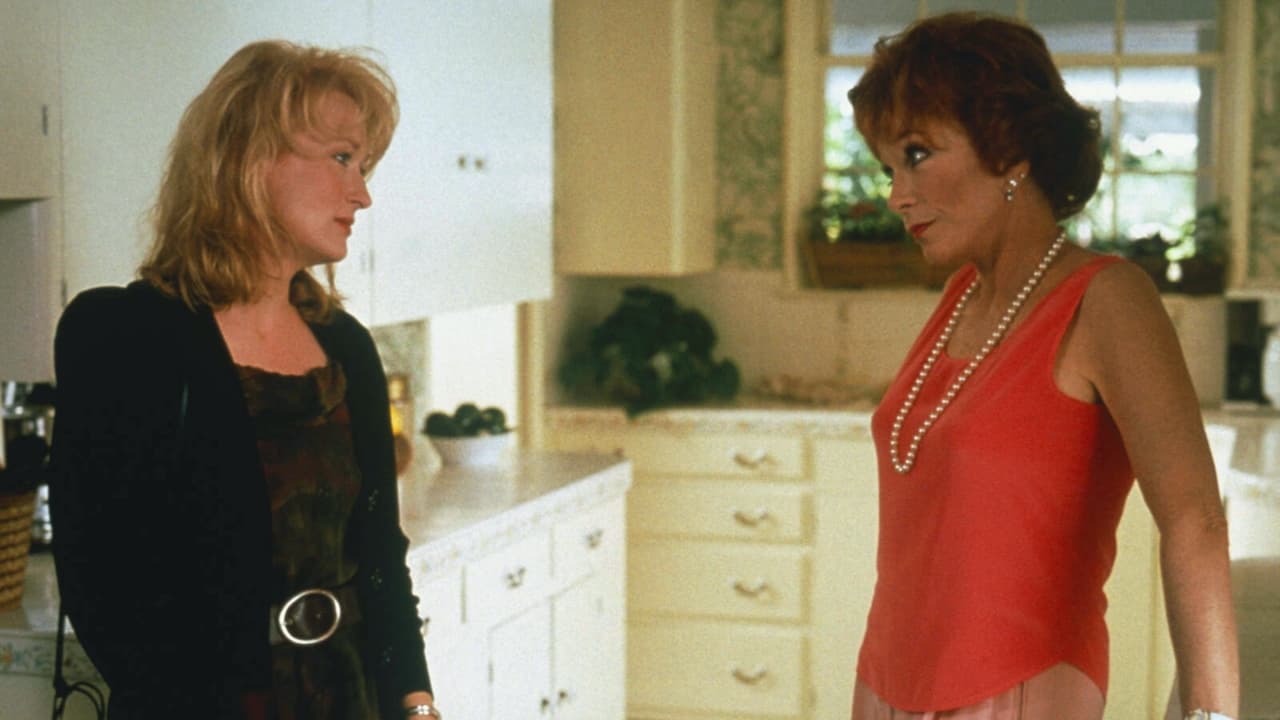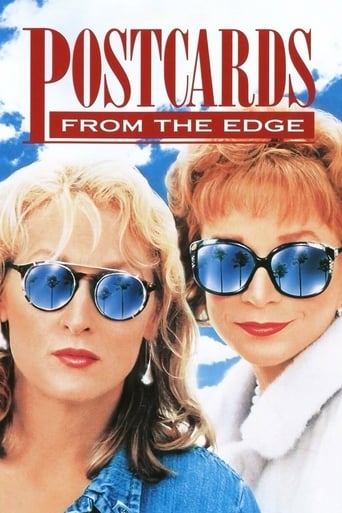



recommended
Boring
what a terribly boring film. I'm sorry but this is absolutely not deserving of best picture and will be forgotten quickly. Entertaining and engaging cinema? No. Nothing performances with flat faces and mistaking silence for subtlety.
View MoreOne of the film's great tricks is that, for a time, you think it will go down a rabbit hole of unrealistic glorification.
View MoreAcademy Award winners, Meryl Streep and Shirley MacLaine play a mother and daughter actress and singers in Hollywood, California. They are loosely based on Carrie Fisher's memoir about her life as the daughter of Debbie Reynolds. The film has great moments with Streep and Maclaine and mother and daughter. The cast is first rate. Mary Wickes who played Grandma was one of Hollywood's greatest character actresses. Conrad Bain played Grandpa. The film is about how Suzanne Vale must live with her mother, Doris Mann, while she is shooting with a film with an all-star cast and directed by Mike Nichols. Gene Hackman played the director. Richard Dreyfuss played the doctor. Carrie Fisher even has a cameo. Annette Bening made her film debut. Dennis Quaid displayed his ability to act with Streep. The film is fine and great to see Meryl Streep sing too. A must for Meryl Streep fans to see and wonder why she's marvelous Meryl Streep.
View MoreMeryl Streep is like a cameleon. I honestly dont know many other actresses that can act so believable. It is truly as if she becomes the person whose role she is playing. In "Postcards from the Edge" Meryl Streep plays a drug addicted moviestar who is forced into a rehab after an overdose. Will she survive? Will she be able to pick up her life again? That's the story. Sounds dramatic and depressing, doesnt it? But it is one of the funniest and dearest movies there is. "Postcards from the Edge" has got some genuine tender moments that really lift up this film above all the other comedies.Because however heavy the story might sound it is truly a lighthearted comedy with a warm gentle heart.For those who know the following supporting actors will be immediately impressed: Rob Reiner, Gene Hackman, Dennis Quaid and ofcourse Shirley MacClaine who plays an oscar worthy role as an alcoholic mother of Meryl Streep.If you love Meryl Streep then you gotta see this wonderful warm and lovely comedy. Directed by the grandmaster Mike Nichols who just cant do anything wrong, on the contrary this man keeps on delivering masterpiece after masterpiece. And he did it again with "Postcards from the Edge"!
View MoreI wouldn't go so far as to call Mike Nichols's "Postcards from the Edge" a masterpiece. It's a good movie, but that's it. Both Meryl Streep and Shirley MacLaine give their best as an actress recovering from drug addiction, and her faded star of a mother. Overall, the movie depicts the entertainment industry as a bastion of emptiness and nastiness (namely in the scene where Streep's character listens to a director talk about her physique). I guess that no one rips at Hollywood more than Hollywood itself.The movie is based on a semi-autobiographical novel by Carrie Fisher. I understand that the novel is told partly in epistolary form, hence the title. The movie is told from the usual first-person perspective. It's not the most biting satire, but the conflict between the mother and daughter set the stage. In one scene, the mom recalls an awkward incident with an executive; I suspect that sort of thing happened more often than we realize.In the end, it's worth seeing. I read that Jamie Lee Curtis and Janet Leigh were considered for the roles; I would've been inclined to cast them.
View MorePostcards From the Edge could have been a great character piece, considering its credentials. However, Mike Nichols went through a period of struggle with his work during the 1980s. His films lacked decent pace and proportionate screen time for all of its characters and subject matter and thus lacked focus. Postcards has this problem. It ends before you know it, it wraps up like it's tired and wants to go to bed, and the conflict has a short burst of presence till it completely diffuses.However, this film has an incredibly high point of enjoyment to level it off. This would be the appearance of a young and beautiful Meryl Streep in a snug police suit. Her curves, her maternal hips, her thighs, her overall thin yet plush softness radiates sensuality.As for her performance, she is of course very enthralling in her depiction of Carrie Fisher's depiction of Carrie Fisher. It's always fascinating to see how comfortable she is with repressing herself just enough to ooze those indescribable facial and tonal expressions that are trademark Meryl.
View More